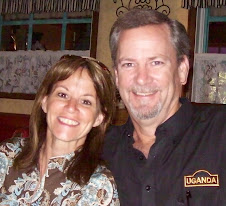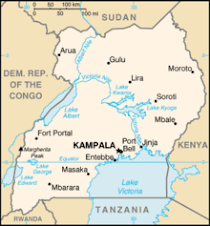 With just a little over 30 days before we’ll be returning to the states for a visit, we’re taking a few minutes to look back over the last eight months of living in Uganda. It’s been quite an adventure…a real melding of cultures; there’s been exasperation, excitement, curiosity, frustration, joy, confusion, moments that have taken our breath away, some moments when we wish we weren’t ‘breathing it all in…” We can’t even imagine not having had the opportunities we’ve had so far; the blessing to meet the people we’ve met; the heartbreaks, the happy moments. It’s been delightful, brilliant, satisfying.
With just a little over 30 days before we’ll be returning to the states for a visit, we’re taking a few minutes to look back over the last eight months of living in Uganda. It’s been quite an adventure…a real melding of cultures; there’s been exasperation, excitement, curiosity, frustration, joy, confusion, moments that have taken our breath away, some moments when we wish we weren’t ‘breathing it all in…” We can’t even imagine not having had the opportunities we’ve had so far; the blessing to meet the people we’ve met; the heartbreaks, the happy moments. It’s been delightful, brilliant, satisfying.And on the lighter side, here’s what it means to live in Uganda;
A need to travel in convoys through many places
Passing truckloads of soldiers with rocket launchers and AK-47’s; they’re always going the other way…is that good or bad?
Learning to distinguish the difference in your mosquito net, between lizard poop, rat poop, roach poop, bat poop and scorpion poop. 

The big three—cockroaches, sweet ants, and big black grease ants. They seem to have an agreement over whose turn it is to own your home. I just spray Doom and watch them fall to a heap. Here that is called "punishing" them with "medicine."
Figuring out why people "smoke their latrines”. They set methane gas beneath the concrete slab (the one with the hole in it you straddle) on fire. They tell us this makes it smell better.
When you shop at any of the Chinese herbal shops, they will sell you one particular medicine that is good for; “relief for cardiac and abdominal pains, rheumatic pains, aching back, quadriplegia, sprains, and bruises, injuries from falls, contusions, strains, cuts, burns, bleeding, stings, bites, and deep-rooted ulcers.” You should know that two of the ingredients are turpentine and kerosene.
You must learn to figure this out: In 2004 a generator cost $600, or 1,065,000 UGX at an exchange rate of 1,775. So if it's $300 at today’s rate of 2,300 shillings, is that a good deal?
Termite mounds are taller than Mike. Anything wood that comes up missing has probably been consumed by the termites for their mounds.
Don’t get excited if you hear a gun blast in the middle of the night. All guards carry guns and forget they’re loaded.
Most all of the delays here can be explained with one sentence, "The man with the key has gone." We have seen schools, churches, businesses closed for weeks because the key is with “the man “and they cannot locate him. Every door in Africa has a key. Our apartment has 6 different keys.
It’s hard to kill these cockroaches with flip flops no matter how hard you smack them.


You see everything in traffic here: Boda-Boda passengers holding huge sheets of plate glass; lorries with 60 armed guards jammed in the back; lost cows, taxies with dead fish on the bumper or squawking chickens hanging out the windows, bicycles with 5-foot
 high stacks of raw eggs or 14-foot lengths of lumber, vendors selling fried grasshoppers or goat on a stick, adolescents on skateboards, beggars, soldiers with AK47s…
high stacks of raw eggs or 14-foot lengths of lumber, vendors selling fried grasshoppers or goat on a stick, adolescents on skateboards, beggars, soldiers with AK47s… Vanilla, Dove soap, and roach motels disappeared from stores 3 months ago. Pudding, ‘Minced’ Helper (like our Hamburger Helper?) and Listerine mouth wash made a debut.
Reasons you won’t get any sleep:
- The neighbors are swarming all over the white ants that are swarming all over the property all around us. Yes, you pull the ‘feathers’ (wings) off and fry them…or not. Good either way.
- The buzz of a mosquito…is it inside the net or outside?
- The endless noise of obnoxious music blaring from bars all around
- Horns ‘hooting’…relentlessly
- Roosters that cannot tell time, so they just tell you each time the hour changes.
Taking a shower in Kitgum— mix water from the borehole with hot water from the coffee pot. (if someone will put the generator on…because there is no power.) Dump over your head.
 Using the toilet in the village: find someone with the key; step over roosters, past cows, goats and pigs…push cement block off hole, ignore the enormous lizard watching you from overhead, pick up travel toilet paper roll from the ground that you always drop, blow the dirt and giant spider off. Think of the squat as part of your work out to build muscles you didn’t know you were suppose to have
Using the toilet in the village: find someone with the key; step over roosters, past cows, goats and pigs…push cement block off hole, ignore the enormous lizard watching you from overhead, pick up travel toilet paper roll from the ground that you always drop, blow the dirt and giant spider off. Think of the squat as part of your work out to build muscles you didn’t know you were suppose to have
If you try to watch a program with anyone here, half-way through, your companions will begin to share some bizarre story…then go back to the show as though they hadn’t just completely interrupted the show. It doesn’t really matter though…either the place you’re staying will change the channel before the show is over anyway, or the power will go off.
At any given time, the electric will be off, the propane empty and “finished” throughout all of Kampala…and you will have no water, but the internet will be up. You can never have it all at the same time. Deal with it. T.I.A.
You have to appreciate the language here; "Had a close call today. The car almost got knocked up by a boda-boda carrying a long, steel pipe." At hotels, the answer to everything you ask for is “sorry, it is just finished.” Driving directions are always hysterical…there is no left or right, there is up, down, or continue while people are making directional hand gestures from the back seat. The answer to your every request, “it is coming.” It is coming can mean anything from 2 hours to 2 weeks. Seriously.
The church collection basket will look something like: a cabbage, a bag of beans, 2 avocados, carrots, 2 onions, 3 eggs and a live chicken…on a good day.
When the internet guy finally shows up to fix your internet, the power will go out.
The insurance company seriously informs you that they will not replace a car windshield more than two times a year.
ALL glass on a car needs to be etched with the license plate number of the car or it will be stolen and resold to you later at the repair shop. Count on it happening at least once.
Tubs and showers here have no shower curtains. We have stopped trying to keep the water from drenching everything in the bathroom. Someone comes in and mops up afterwards. A curtain would be so easy.
It’s a big deal if you get served the gizzard of a chicken. It means they killed the bird for you.

What’s wrong with this picture? The meat markets are little places in the market where the vendor sits INSIDE while the meat hangs OUTSIDE…in the heat. hmmm
 A knife sharpener is someone showing up with a bike and pedaling madly while holding your knife in a contraption on top
A knife sharpener is someone showing up with a bike and pedaling madly while holding your knife in a contraption on top Deworming is a fact of life here. And we thought it was just for our pets back home.
Do not try to return soda bottles without buying new sodas. A refund is inconceivable and perplexing.
 You really miss home at Christmas when the Christmas decorating involves the Energizer Bunny being pulled by reindeer.
You really miss home at Christmas when the Christmas decorating involves the Energizer Bunny being pulled by reindeer.

Count on fun “extras” in everything you purchase from the market; baby roaches in the egg cartons; roaches imbedded in the toilet paper; feathers and chicken poop still on the eggs. No, you don’t pay extra. And then there’s the game our good friends who know we love word games gave us for Christmas…”SCRAMBLE, the WORLD game” uh huh.
 And my favorite…If clothes are hung outside, and they always are, it is very possible for a female fly to lay eggs on them. The clothes are then worn and the eggs penetrate the skin and within three days, painful, boil-like lesions occur. Pus emerges from each sore as it gets ripe. Once the sore is expressed a worm comes out of it. Ick. We'll try to leave these behind when we visit.
And my favorite…If clothes are hung outside, and they always are, it is very possible for a female fly to lay eggs on them. The clothes are then worn and the eggs penetrate the skin and within three days, painful, boil-like lesions occur. Pus emerges from each sore as it gets ripe. Once the sore is expressed a worm comes out of it. Ick. We'll try to leave these behind when we visit. 














